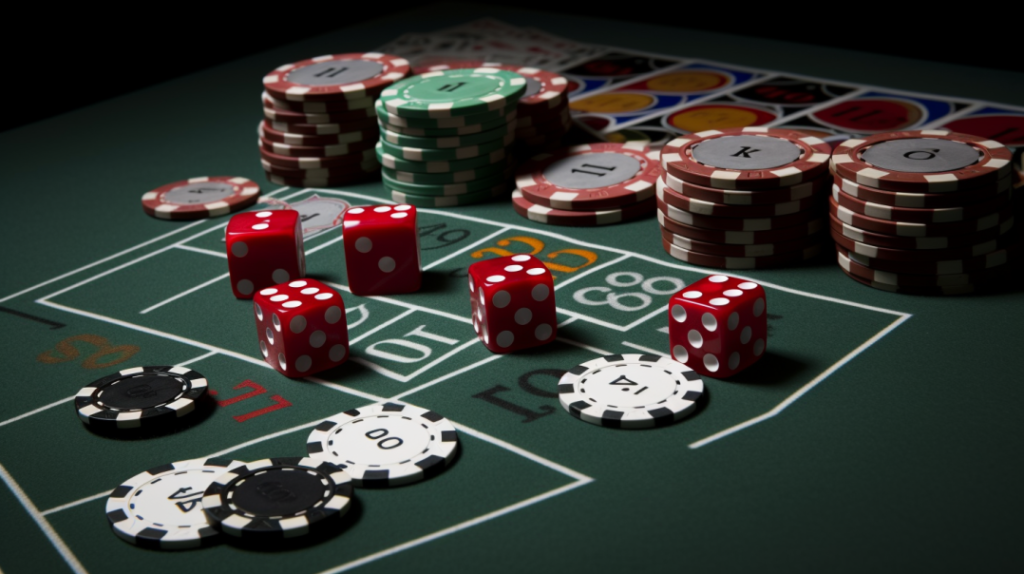The Mathematics of Gambling: Exploring the Odds and Probabilities of Casino Games
Introduction
Gambling has captivated countless individuals worldwide, with its enchanting allure of card games, dice, and slot machines. But have you ever pondered the mathematical principles underpinning these games? This article delves into the captivating world of gambling mathematics, exploring the odds and probabilities governing casino games. Grasping these mathematical concepts enables gamblers to make well-informed decisions and appreciate the inner workings of these games.
Probability: The Linchpin of Gambling
Probability is an indispensable concept in gambling. It measures the likelihood of an event transpiring, denoted as a number between 0 and 1. In casino games, the probability of winning or losing is dictated by game rules and the inherent randomness of outcomes.
The house edge, representing the casino’s mathematical advantage over players, is a crucial aspect of casino settings. Typically expressed as a percentage, the house edge reflects the long-term average profit the casino anticipates from each bet players place. Comprehending the house edge in various casino games aids players in making informed decisions about which games to play and which bets to place.
Deciphering Odds and Payouts
In gambling, odds convey the relationship between the number of ways an event can occur (successes) and the number of ways it cannot (failures). Odds can be expressed in two common ways: fractional odds and decimal odds.
Fractional odds, written as a fraction (e.g., 5/1), represent potential profit per unit bet. Decimal odds, written as a decimal number (e.g., 6.00), signify the total payout (including the original stake) per unit bet. The following formulas can be used to calculate implied probability from either fractional or decimal odds:
Implied Probability (Fractional Odds) = 1 / (Fractional Odds + 1)
Implied Probability (Decimal Odds) = 1 / Decimal Odds
Payouts refer to the amounts paid to winning players. To calculate a winning bet’s payout, multiply the stake by the decimal odds. Note that the payout encompasses both the profit and the original stake.
Delving into the Mathematics of Popular Casino Games
Roulette
Roulette, a classic casino game, involves players betting on a spinning wheel’s outcome. The wheel contains numbered pockets, with the ball eventually landing in one. The most prevalent types of roulette are European (37 pockets, including a single zero) and American (38 pockets, including a single zero and a double zero).
In European roulette, the house edge is roughly 2.7%, while it rises to 5.26% in American roulette. This increase results from the additional double zero pocket, which diminishes the probability of winning for all bets.
Blackjack
Blackjack, a widely played card game, aims for a hand value closer to 21 than the dealer’s without exceeding it. The probability of winning in blackjack hinges on the player’s decisions and the dealer’s upcard. Employing basic strategy (optimal decision-making rules based on the player’s hand and the dealer’s upcard), a proficient player can whittle the house edge down to as low as 0.5%.
Slot Machines
Slot machines utilize a random number generator (RNG) to establish each spin’s outcome. The house edge for slot machines varies significantly, ranging from as low as 1% to as high as 15%. The return to player (RTP) percentage, the house edge’s inverse, denotes the percentage of total bets a player can expect to win back in the long run.
Craps
Craps, a dice game, requires players to bet on a roll or a series of rolls’ outcomes. The house edge for craps differs markedly based on the type of bet placed. The most favorable bets, like the pass line bet, boast a house edge of a mere 1.41%, while others, such as the any seven bet, have a staggering house edge of up to 16.67%.
Baccarat
Baccarat, a card game, challenges players to bet on which hand—the player’s, the banker’s, or a tie—will possess the highest value. Baccarat has a relatively low house edge compared to other casino games. Betting on the player’s hand results in a 1.24% house edge, while wagering on the banker’s hand yields a 1.06% edge. However, betting on a tie carries a significantly higher house edge of approximately 14.36%.
The Crucial Role of Bankroll Management and Responsible Gambling
Despite the captivating mathematical intricacies of casino games, it is vital for players to practice responsible gambling and bankroll management. This involves setting and adhering to limits on the amount of money one is willing to risk. By doing so, players can avoid substantial financial losses and continue relishing the entertainment provided by casino games.
Conclusion
Gambling mathematics is a mesmerizing topic that sheds light on the odds and probabilities of diverse casino games. Understanding these concepts enables players to make better-informed decisions when placing bets and choosing games to play. Moreover, practicing responsible gambling and bankroll management is essential for the long-term enjoyment of casino games. Equipped with this knowledge, gamblers can gain a deeper understanding and appreciation for the complex mechanisms of their favorite games.

